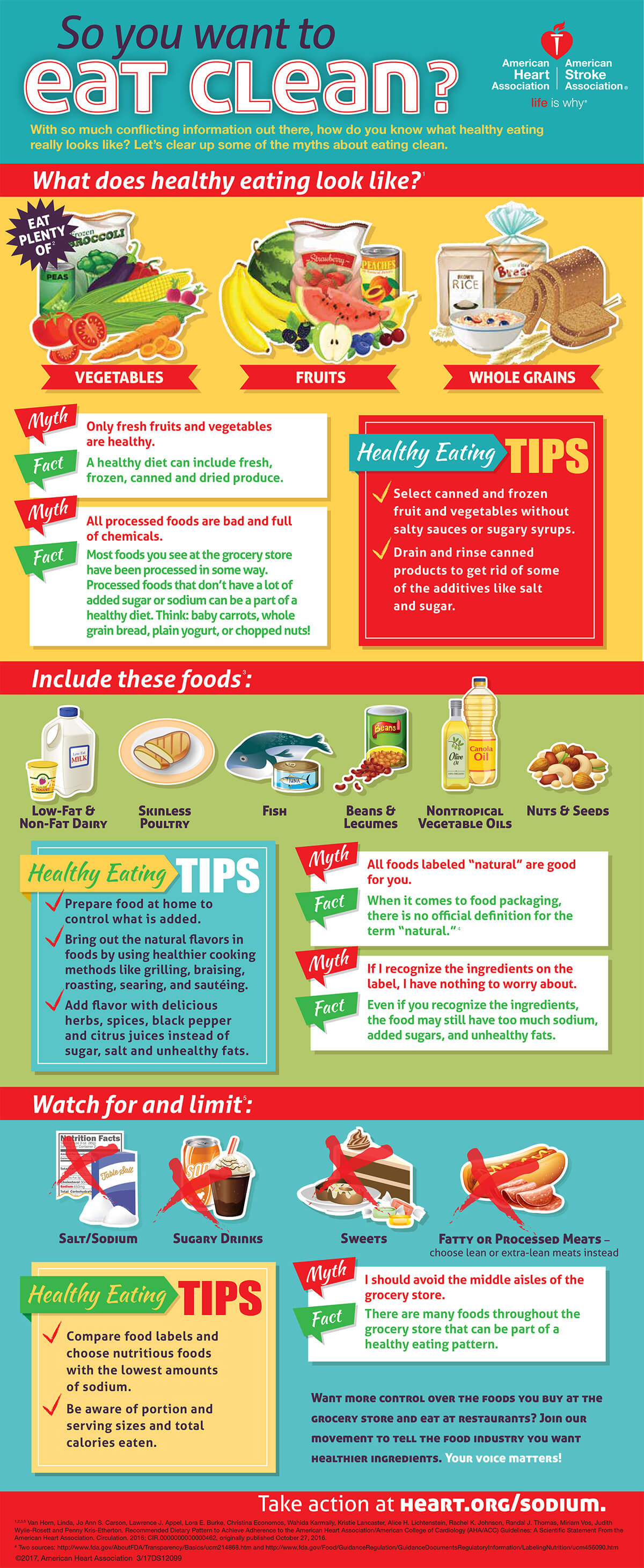What is clean eating? Infographic

So you want to eat clean?
With so much conflicting information out there, how do you know what healthy eating really looks like? Let’s clear up some of the myths about "eating clean."
What does healthy eating look like?
Eat plenty of:1
Vegetables2 FruitsWhole grains
Myth: Only fresh fruits and vegetables are healthy.
Fact: A healthy diet can include fresh, frozen, canned and dried produce.
Myth: All processed foods are bad.
Fact: Most foods you see at the grocery store have been processed in some way. Processed foods that don’t have a lot of added sugar or sodium can be a part of a healthy diet. Think: baby carrots, whole grain bread, plain yogurt, or chopped nuts!
Healthy Eating Tips:
- Select canned and frozen fruit and vegetables without salty sauces or sugary syrups.
- Drain and rinse canned products to get rid of some of the additives like salt and sugar.
Include these foods:3
- Low-fat and non-fat dairy
- Skinless poultry
- Fish
- Beans and legumes
- Nontropical vegetable oils
- Nuts and seeds
Myth: All foods labeled “natural” are good for you.
Fact: When it comes to food packaging, there is no official definition for the term “natural.”4
Myth: If I recognize the ingredients on the label, I have nothing to worry about.
Fact: Even if you recognize the ingredients, the food may still have too much sodium, added sugars, and unhealthy fats.
Healthy Eating Tips:
- Prepare food at home to control what is added.
- Bring out the natural flavors in foods by using healthier cooking methods like grilling, braising, roasting, searing, and sautéing.
- Add flavor with delicious herbs, spices, black pepper and citrus juices instead of sugar, salt and unhealthy fats.
Watch for and limit:5
- Salt/Sodium
- Sugary drinks
- Sweets
- Fatty or processed meats – choose lean or extra-lean meats instead
Myth: I should avoid the middle aisles of the grocery store.
Fact: There are many foods throughout the grocery store that can be part of a healthy eating pattern.
Healthy Eating Tips:
- Compare food labels and choose nutritious foods with the lowest amounts of sodium.
- Be aware of portion and serving sizes and total calories eaten.
Want more control over the foods you buy at the grocery store and eat at restaurants?
Join our movement to tell the food industry you want healthier ingredients. Your voice matters! Take action at heart.org/sodium.
Download a PDF of this infographic.
[1] Van Horn, Linda, Jo Ann S. Carson, Lawrence J. Appel, Lora E. Burke, Christina Economos, Wahida Karmally, Kristie Lancaster, Alice H. Lichtenstein, Rachel K. Johnson, Randal J. Thomas, Miriam Vos, Judith Wylie-Rosett and Penny Kris-Etherton. Recommended Dietary Pattern to Achieve Adherence to the American Heart Association/American College of Cardiology (AHA/ACC) Guidelines: A Scientific Statement From the American Heart Association(link opens in new window). Circulation. 2016 CIR.0000000000000462, originally published October 27, 2016.
[2] Van Horn, Linda, Jo Ann S. Carson, Lawrence J. Appel, Lora E. Burke, Christina Economos, Wahida Karmally, Kristie Lancaster, Alice H. Lichtenstein, Rachel K. Johnson, Randal J. Thomas, Miriam Vos, Judith Wylie-Rosett and Penny Kris-Etherton. Recommended Dietary Pattern to Achieve Adherence to the American Heart Association/American College of Cardiology (AHA/ACC) Guidelines: A Scientific Statement From the American Heart Association(link opens in new window). Circulation. 2016; CIR.0000000000000462, originally published October 27, 2016.
[3] Van Horn, Linda, Jo Ann S. Carson, Lawrence J. Appel, Lora E. Burke, Christina Economos, Wahida Karmally, Kristie Lancaster, Alice H. Lichtenstein, Rachel K. Johnson, Randal J. Thomas, Miriam Vos, Judith Wylie-Rosett and Penny Kris-Etherton. Recommended Dietary Pattern to Achieve Adherence to the American Heart Association/American College of Cardiology (AHA/ACC) Guidelines: A Scientific Statement From the American Heart Association(link opens in new window). Circulation. 2016; CIR.0000000000000462 originally published October 27, 2016.
[4] FDA: Use of the Term Natural on Food Labeling
[5] Van Horn, Linda, Jo Ann S. Carson, Lawrence J. Appel, Lora E. Burke, Christina Economos, Wahida Karmally, Kristie Lancaster, Alice H. Lichtenstein, Rachel K. Johnson, Randal J. Thomas, Miriam Vos, Judith Wylie-Rosett and Penny Kris-Etherton.Recommended Dietary Pattern to Achieve Adherence to the American Heart Association/American College of Cardiology (AHA/ACC) Guidelines: A Scientific Statement From the American Heart Association(link opens in new window). Circulation. 2016; CIR.0000000000000462, originally published October 27, 2016.

